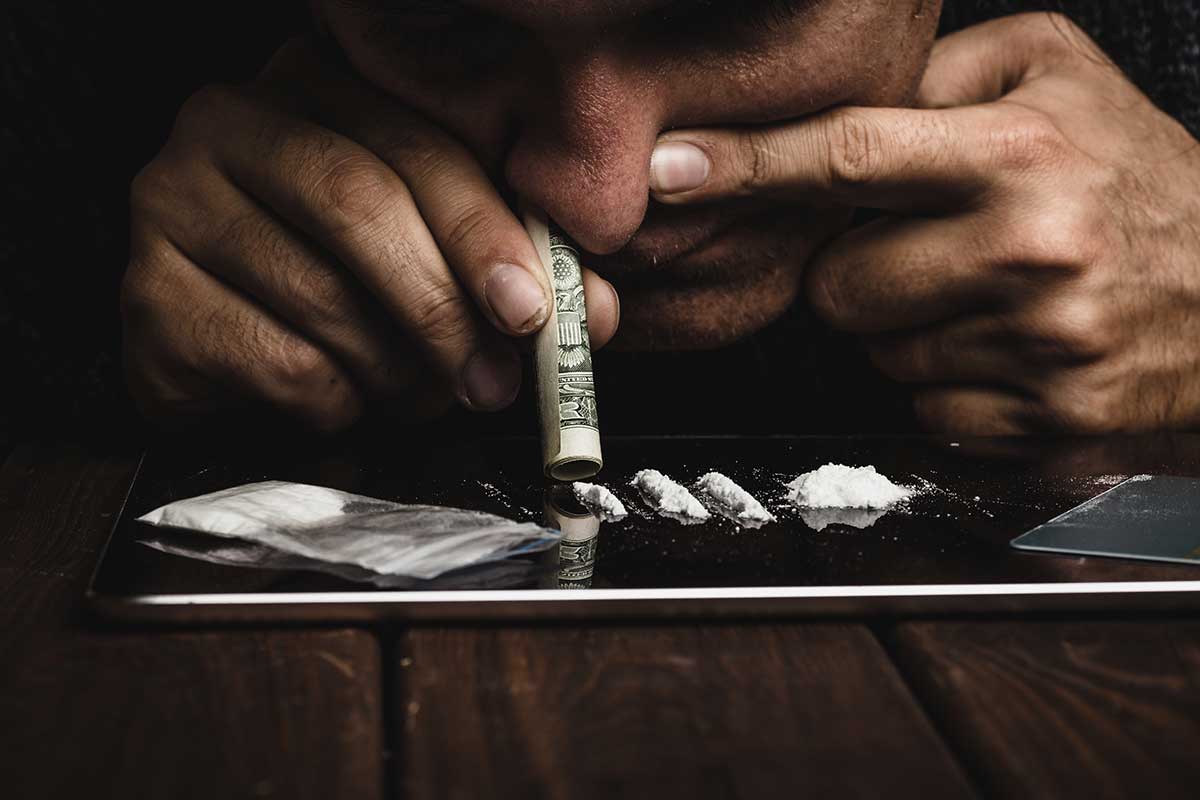The 7 Hardest Drug Addictions to Kick

More than 23.5 million Americans are addicted to drugs or alcohol, but only 11% of those addicted ever get the treatment they need. Many people attempt to quit themselves, often trying and failing multiple times – sometimes never succeeding. This pattern mimics one that many of us see in our everyday lives with less stigmatic drugs like caffeine, cigarettes, and sugar. Many people try to quit on their own, make it a few days, and then 'relapse', and have another cup of Starbucks.
But why are substances so addicting? And why are some of them harder to 'kick' than others? While the answer lies in the complex way that chemicals interact with receptors in our brains, and how our bodies adjust to those chemicals, that answer isn't hugely helpful in determining how difficult it is to quit.
In 2007, a study measuring the potential misuse of drugs scored common substances based on their 'addictiveness' and therefore how difficult the habit is to kick. While there are many drugs you might expect to see on the list, others, like nicotine, might surprise you.
Why is it Harder to Quite Some Drugs than Others?
Quitting is hard, even for relatively milder addictions. Anyone who has ever tried to quit drinking coffee or soda, only to be hit with splitting headaches (relatively mild in comparison to what you get quitting heroin) could tell you that. The difficulty of quitting, or kicking the habit, is determined by a few factors, but largely:
- The drug's interaction with the dopamine receptors
- The severity of withdrawal symptoms
- Cognitive changes caused by the drug
- Physical damage (such as gastrointestinal distress) caused by the drug
- Psychological addiction
- Cravings
These factors can be measured, and fairly easily used to determine how difficult it will be to quit a drug. However, personal factors also come into play. These are largely personal willpower (sense of self and ego), motivation, and discipline or self-control. A very disciplined person could likely force themselves to go through withdrawal and then to quit substance use on the first try. Unfortunately, most people who become addicted don't have strong self-denial skills to begin with, and the effects of most drugs naturally erode these skills. So, most must re-learn them in recovery.
The 7 Hardest Drug Addictions to Kick
While any drug habit is hard to recover from, the following 7 are among the hardest habits to kick.
1. Nicotine
There are over 40 million smokers in the United States, and 35 million of them regularly say they want to quit. Yet, most of them don't. Most of us are aware that smoking is the #1 cause of preventable death in the United States, and people continue to smoke. Why? Withdrawal is extremely difficult and many users quickly relapse within 3-15 days. In one study, it was shown that the average person has attempted to quit more than 35 times, but 85% fail. Nicotine hits the brain in just 10-30 seconds and withdrawal symptoms can start a few hours after putting down your last. However, that's not why most people fail. The average quitter makes it through the worst withdrawal period of 3-5 days, and then, overconfident that they're over the worst, give in to cravings.
2. Benzodiazepines
Benzos like Valium and Xanax are among the most commonly prescribed drugs in the United States, but they are extremely addictive. In fact, most benzodiazepines now have a recommended prescription length of just 5 weeks, while historically, many users have been given prescriptions that go on for years or even decades. Benzodiazapines affect the dopamine receptors and GABA receptors in the brain, which eventually becomes reliant on them. Over the long-term, these drugs are linked to increasing anxiety, panic attacks, and even increased aggression, as their continued presence causes more and more changes to the brain. Quitting them causes strong withdrawal symptoms like insomnia, hallucinations, anxiety, cramps, nausea, headaches, vomiting, and depression. Symptoms are so bad that most users should have medical care during detox and many eventually take a pill again to stop the symptoms. However, benzos are also extremely mentally addicting. Because many users take pills to stop anxiety, PTSD symptoms, depressive episodes, or even panic attacks, they come to rely on the effect of the pill stopping that episode to the point where it becomes a placebo, which is an even more difficult addiction to kick.
3. Cocaine
Cocaine and crack cocaine are abused by nearly 20 million people worldwide, with an estimated 1.5 million addicts in the USA. Cocaine floods the brain with massive amounts of dopamine, resulting in a euphoric rush that often leaves users feeling emotionally blunted afterwards. It's also responsible for about 40% of all drug-related emergency room visits. Like nicotine, cocaine is typically inhaled, reaching the brain within just a few minutes, which means that withdrawal symptoms set in quickly. Users typically experience a strong depressive crash, anxiety, agitation, nightmares, restlessness, and irritability. Like other drugs, many use again to reduce the withdrawal symptoms. However, emotional blunting, which reduces the experience of everyday life and the desire to feel something again are often what push users into relapsing.
4. Amphetamines
Prescription amphetamines like Adderall and Myadis are used to treat a variety of problems ranging from depression and anxiety to ADHD and obesity. However, they are also one of the most addictive drugs in the world, mimicking the effect of dopamine and norepinephrine in the brain, creating a rush of adrenaline alongside euphoria. During withdrawal, these dual effects come into play to make the drug extremely difficult to quit, with strong cravings and withdrawal symptoms. Users experience depression, anxiety, panic attacks, and mood swings, combined with flu symptoms accompanying most withdrawal – and may be a danger to themselves. Most are recommended to taper off the drug to reduce withdrawal symptoms and to detox under medical care.
5. Methamphetamine
Methamphetamine and Crystal Meth are a form of amphetamines, but typically considerably stronger than what you get under a prescription. Methamphetamine is the powdered version, while crystal meth is a stronger version sold in 'crystals' to be smoked or injected. The drug is a central nervous system stimulant, giving the same but a stronger version of the high associated with prescription amphetamines. As a result, withdrawal symptoms and cravings are stronger than over-the-counter amphetamines, and many users have an even harder time kicking the habit.
6. Morphine
Morphine is an opiate and one of the most addictive drugs on the planet. While used in clinical settings for pain relief and sedation, morphine has a long history in the United States and around the world as an addictive narcotic, and one of the hardest addictions to get over. Over 20 million people are addicted to opiates worldwide, and with 91 people in the United States dying each day because of an opioid drug related factor, morphine is extremely dangerous. However, it's extremely difficult to withdraw from. Most users experience depression, increased blood pressure, arrhythmia, muscle pain, irritability, mood swings, vomiting, insomnia, tremors, and strong cravings. Mental addiction and cravings, alongside stress and anxiety caused by withdrawal, often make detox extremely difficult to get through alone.
7. Heroin
Heroin, or diamorphine, is an opioid, typically synthesized as stronger and more addictive than morphine. While the two drugs are closely related, heroin is up to 200x stronger than its medically approved 'cousin', and equally more dangerous and addictive. Users often overdose, and more than a quarter of the opioid related deaths in the United States are caused by the drug. Withdrawal symptoms are typically more severe than morphine, but include the same pattern of muscle aches, stomach pain and vomiting, tremors, and cravings.
Most drugs are mentally and physically addictive, and users can have more trouble kicking their mental habits than their physical ones. For example, while many people make it through the first 3-4 days of quitting cigarettes, they often slip up and go back to smoking afterwards, after the worst of the withdrawal symptoms have passed. Getting treatment, including therapy, to help with the mental aspects of detox and recovery can be an important part of ensuring that someone stays clean after detox.
For users who are very heavily addicted, who might experience strong or even dangerous withdrawal symptoms, most treatment centers offer some form of Medication Assisted Treatment (MAT), with a medication like Suboxone to reduce withdrawal symptoms and prevent cravings during treatment and therapy. This ensure that the recovering addict can make it through recovery, focus on their treatment, and withdraw from their drug safely.
If you or your loved one is struggling with addiction, you can talk to us about addiction treatment programs at our affordable drug and alcohol rehab that fit your needs, contact us today. The Anaheim Lighthouse is a modern and effective addiction treatment center in Southern California.














